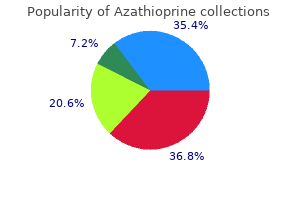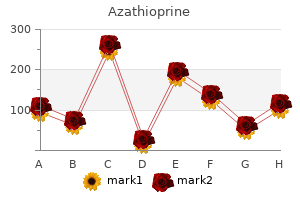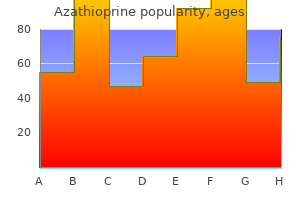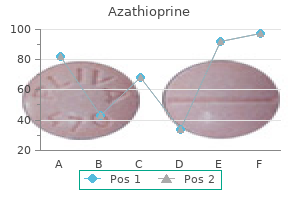Azathioprine
"Cheap azathioprine 50mg, spasms of the diaphragm".
By: M. Javier, MD
Professor, Campbell University School of Osteopathic Medicine
Comments: Some commenters argued that unequal appeal rights will have an adverse effect on campus safety muscle relaxant hydrochloride buy 50 mg azathioprine with amex. Commenters cited the high rates of sexual assault and harassment and expressed fear about attending campus if these regulations take effect muscle relaxant 5859 buy 50 mg azathioprine mastercard. Commenters expressed concern that victims will experience further trauma and not be able to receive an education if recipients cannot punish their attacker back spasms 32 weeks pregnant purchase 50mg azathioprine amex. We are leaving recipients with the discretion to permit both parties to appeal sanctions spasms film discount azathioprine 50 mg with visa, provided that such an appeal must be offered equally to both parties. The Department believes that by offering appeals to both complainants and respondents on an equal basis, recipients will be more likely to reach sound determinations, giving the parties greater confidence in the ultimate outcome. Both complainants and respondents have significant interests in the outcomes of these proceedings; the consequences of a particular determination of responsibility or sanction can be life-altering for both parties and thus each determination must be factually accurate. They contended that it is unfair to allow one party to appeal sanctions, but not the other party. Commenters asserted that complainants should have a say in the sanctions delivered to the respondents. Other commenters argued that complainants should be allowed to appeal sanctions because they will have a strong interest in doing so, while respondents should not be allowed to appeal sanctions because they would only do so out of self-interest. The Department wishes to clarify that if recipients decide to offer appeal rights regarding sanctions, then both complainants and respondents must have the same rights to appeal. Comments: Some commenters argued that the Department should require institutions to offer appeals. They argued that mandated appeals will ensure uniformity, reduce litigation, and will be necessary due to the decreased standard of liability. Other commenters expressed concern that offering complainants the right to appeal would violate due process. They argued that a false finding of responsibility will result in life-altering stigma and harm to respondents and that their interest in avoiding double jeopardy is significant. Some commenters suggested that if respondents are allowed to appeal, they should only be allowed to appeal for blatant errors. Commenters suggested that the Department ensure a third-party appeals process to protect the fairness and independence of the decisions on appeal. Discussion: the Department is persuaded by the concerns raised by commenters, and we note that § 106. However, we also believe that complainants have significant, life-altering interests at stake, and that they "have a right, and are entitled to expect, that they may attend [school] without fear of sexual assault or harassment. Further, we believe that appeal rights for respondents should not be limited to "blatant errors," as suggested by one commenter. Instead, the final regulations specify the bases upon which either party can appeal, including procedural irregularity or bias or conflict of interest in key personnel involved in the adjudicative process that affected the outcome, or newly discovered evidence that would affect the outcome. The Department also notes that appeal decision-makers must be free from bias and conflicts of interest, and be trained to serve impartially, as required under § 106. We respectfully disagree with the commenters who argued that the final regulations should prohibit appeals of not responsible determinations because of double jeopardy concerns. The Department does not believe that a third party independent from the recipient would need to handle appeals to ensure impartiality and fairness. Would-be complainants often declined to come forward with complaints because they were offered only two roads forward: the full formal process leading to possibly severe punishment for the respondent, or counseling for themselves. Additionally, often both parties would have preferred informal resolution; a rule that pushed them to adopt an 1363 adversarial posture vis a vis each other meant that the conflict persisted, and even escalated, when it could have been settled. One commenter emphasized that sometimes alleged victims just want to be heard, that confidential settlement conferences should be required before any formal hearing process, and the final regulations should prohibit any settlement mediator from being called as a witness in subsequent proceedings. Another commenter argued that where the default option of mediation fails, the parties should then turn to the court system. One commenter suggested the Department place informal resolution near the start of the final regulations to encourage its use. Several commenters noted that informal resolution can empower victims and increase flexibility to address unique situations; they argued that informal resolution increases choice by allowing both parties to choose the option that is right for them and that the Department should not arbitrarily force them into a formal process.


This commenter argued that if Congress intended for the denial of benefits clause to be as narrow as the exclusion from participation clause spasms lower left side cheap azathioprine 50 mg amex, Congress would not have bothered using the two phrases separately; rules of statutory construction mean that Congress does not use words accidentally or without meaning muscle relaxant reversal agents cheap azathioprine 50 mg with mastercard. One commenter expressed concern over the varied interpretations of "access" to educational activities among Federal courts spasms gums buy discount azathioprine 50mg line, noting that some interpret it narrowly muscle relaxant hamstring purchase azathioprine 50 mg amex. Another commenter requested clarification that the Department interprets the "effective denial of equal access" element as not just physical inability to attend classes but also where a complainant experiences negative impacts on learning opportunities. A few commenters expressed concern that this element could have detrimental effects on international students because they rely on student visas that require them to meet a certain 521 academic performance, so waiting until academic performance has suffered may be too late to help the international student because the student may already have lost their student visa. At least one commenter argued that this element is inappropriate in the elementary and secondary school context because the time-limited nature of education during the developmental years means that requiring inaction until a student has already lost educational access impedes basic civil rights. Several commenters urged the Department to adopt an alternative approach adapted from workplace sexual harassment law, under which unwelcome conduct is actionable where it creates an environment reasonably perceived (and actually perceived) as hostile and abusive, altering work conditions, without requiring any showing of a tangible adverse action or psychological harm. This commenter contended that harassment in the form of cat-calling, for instance, creates a hostile environment even without interfering with access to education, and should not be tolerated. The Department reiterates that this element does not apply to the first or third prongs of the § 106. This element identifies severe, pervasive, objectively offensive unwelcome conduct that deprives the complainant of equal access, measured against the access of a person who has not been subjected to the sexual harassment. Therefore, we do not intend for this element to mean that more victims will withdraw from classes or drop out of school, or that only victims who do so will have recourse from their schools. The Department acknowledges that individuals react to sexual harassment in a wide variety of ways, and does not interpret the Davis standard to require certain manifestations of trauma or a "constructive expulsion. School officials turning away a complainant by deciding the complainant was "not traumatized enough" would be impermissible under the final regulations because § 106. However, neither law requires "tangible adverse action or psychological harm" before the sexual harassment may be actionable, as a commenter feared would be required under these final regulations. The Department agrees that the Supreme Court used a variety of phrasing through the majority opinion to describe the "denial of equal access" element. The Department acknowledges that the 2001 Guidance and 2017 Q&A use the phrase "hostile environment" to describe sexual harassment that is not quid 756 Id. Harassment of this type is generally referred to as hostile environment harassment. The withdrawn 2011 Dear Colleague Letter and withdrawn 2014 Q&A similarly relied on a hostile environment theory of sexual harassment. Even though these final regulations do not rely on a "hostile environment" theory of sexual harassment, a recipient may choose to deliver special training to a class, disseminate information, or take other steps that are designed to clearly communicate the message that the school does not tolerate harassment and will be responsive to any student who reports sexual harassment, as described in the 2001 Guidance, so that no person is effectively denied equal access to education. Changes: We have revised several provisions to ensure the word "equal" appears before "access". Prong (3) Sexual Assault, Dating Violence, Domestic Violence, Stalking Comments: Some commenters approved of the third prong of the § 106. Several commenters argued that dating violence, domestic violence, and stalking are just as serious as sexual harassment and sexual assault. A few commenters noted that dating violence was recently added as a reportable crime under the Clery Act in part because 90 percent of all campus rapes occur via date rapes, 762 and dating violence should be included in the § 106. Some commenters asserted that domestic violence is prevalent among youth, and that the highest rate of dating violence and domestic violence against females occurs between the ages of Commenters cited. Many commenters asserted that stalking is very common on college campuses and within the college population; persons aged 18-24 (the average age of most college students) experience the highest rates of stalking victimization of any age group; 766 and college-aged women are stalked at higher rates than the general population and that one study showed that over 13 percent of college women had experienced stalking in the academic year prior to the study. This commenter argued that failure to address sex-based stalking may have dire consequences; the commenter stated that several tragic homicides of female students 770 were preceded by this fairly standard stalking-turned-violent pattern. Commenters correctly pointed out that without specific inclusion of dating violence, domestic violence, and stalking in the third prong of § 106. Dating violence, domestic violence, and stalking are inherently serious sexbased offenses 772 that risk equal educational access, and failing to provide redress for even a single incident does, as commenters assert, present unnecessary risk of allowing sex-based violence to escalate. As commenters noted, dating violence and domestic violence may fail to meet the Davis standard because although a single instance is severe it may not be pervasive, while a course of conduct constituting stalking could fail to meet the Davis standard because the behaviors, while pervasive, may not independently seem severe. Comments: One commenter objected to the reference to "sexual assault" in the third prong of the § 106.

Self-Learning Booklet: Understanding Masculinities and Violence Against Women and Girls 31 Learning about sex and intimate relationships Inpuberty gastric spasms order azathioprine 50mg with visa,youngpeoplestarttoexperiencemajorchangesintheirbodies muscle relaxant clonazepam order azathioprine 50mg on line, andstarttohavesexualfeelingsanddesiresthattheyhavenotfeltbefore muscle relaxant of choice in renal failure purchase 50mg azathioprine mastercard. Stateorcustomarylawallowsgirlsunder18tomarry with parental consent in 146 countries spasms translation purchase azathioprine 50mg overnight delivery. In 52 countries, girls under 15 can marrywithparentalconsent;boysyoungerthan15canmarrywithparental consentin23countries. In 2002, the World Health Organisation estimated that 73 millionboysand150milliongirlsundertheageof18yearshadexperienced various forms of sexual violence2. One of the very few large-scale studies, basedon21epidemiologicalsurveysfromcountriesintheglobalnorth,found that 3-29 percent for men, compared to 7-36 percent of women, reported someexperienceofsexualabusebeforetheageof183. Growing up, we learn about sex in relation to whatitmeanstobeaboyandbeagirl,andinparticularinrelationtothe differences between being a girl and being a boy. Boyslearnthatmenare believedandexpectedtobemoresexualthanwomen;thatis,moreinterested in having sex, more sexually active with more partners and naturally more sexuallyassertivethanwomen. Impacts in terms of sexual violenceTheideathatsexwithwomenisawaytodemonstratemasculinity canleadsomeyoungmentoregardwomenassexualobjects. Notonlydidlargenumbersofmenreport having raped a woman (from 10-62 percent of the men across the study sites), but half (49 percent) of themenwhoreportedhavingrapedawomandidsofor thefirst timewhen theywere teenagers, witharelativelylargeproportionofmeninsomesitesreportingthattheywereyoungerthan15years atthetimetheyfirstperpetratedrape. Asthemillionsofdollarsspentbythebeautyandfashionindustriesremindsus,there are large profits to be made from the ideals of feminine beauty with which many young women are raisedandtowhichtheymustcomparethemselves. This absence of services is especially troubling when it comes to supporting children who have experienced some form of sexual violence. Most of this violence goes unreported, and even when it is disclosed, few services are available to support child survivors. Beliefs about male strength and invulnerability thataresocentral topatriarchalmasculinitiesmakeitparticularlydifficultforboys to tellothersaboutsexualabusetheyhavesuffered. Changing conditions for male socialization Inarapidlychangingworld,ideasaboutmasculinitiesandfemininities,and the roles, behaviours and attributes associated with women and men, are also changing. In some of these changing conditions can be seen negative pressureswhicharehelpingtoreinforcepatriarchalmasculinities. Wheremenmayface decreasedearningpowerandgreaterdifficultyfulfillingtheroleofprovider,theymayresorttoviolence to retain or regain control or authority in their relationships and households. Researchinlower-,middle-andhigh-incomecountrieshasfoundthat,despitethesignificantincreaseof womeninthepaidworkforce,thetimespentonunpaidworkbywomenisbetweentwoandtentimes more than the time spent on the same work by men. Moreover, women are more often the primary caregiversnotonlyforchildren,butalsoforelderlyorsickrelatives. Suchdiscontentsareexploitedbyforces,suchasmilitantnationalist,sectarianandreligious fundamentalist movements, which use images and messages of patriarchal masculinities to recruit youngmentotheircause. Moreover,93percentreported that they are satisfied with the current- and highly unequal-division of household duties in their homes. No wonder many young men are confused about what masculinity means andshouldmeantothem. Amixofgroupeducationandbroaderawareness-raisingactivities are used to help young people discuss and reflect on the links between masculinities, femininities, violence and equality and to develop skills and strategies for changing their own behaviour and the schoolenvironmentinsupportofnon-violenceandgreatergenderequality. Look atthetablebelowtolearnmoreaboutkeylessonsthathavebeenlearned in working with boys and young men to promote more transformative masculinities. Promoting gender equality Start with a positive vision Across the world, many social problems, such as delinquency and crime, are blamed on young men. A report on young men and masculinity in sub-Saharan Africa makes the pointthatyoungmen,particularlylowincome,urban-basedyoungmen,intheAfricancontextareoften stigmatized,beingportrayedascriminals,delinquentsorpotentialoractualtroublemakersorpredators. Theseincludedifferencesbasedonage,economiccircumstances, sexual and/or gender identity, experiences of social privilege/marginalization linked to race, ethnicity, religiousaffiliation,dis/ability,aswellaseducationallevel,rural/urbanlocationandnationalitystatus. Forsome,thishas involved developing programs that work with girls and boys together. Foster skills and relationships for changeAclearlessontoemergefromworkwithboysandyoungmenis thatitisnotsimplyaboutprovidinginformationoreveneducation. Work on sexuality and relationships Programs working with boys and young men often find that an importantareaofworkrelatestoissuesofsex,sexualityandrelationships. Empoweringyoungwomen toassert theirrights,andworking with young men on practices of consent to ensure that young women freely consent to whatever happensintherelationship,havebecomeanimportantfocusofwork.

Syndromes
- Seizures
- Hysterectomy: This invasive surgery may be an option if medicines do not work and other surgeries and procedures are not an option.
- Calm and reassure the person.
- Tuberculosis
- Why the C-section was done
- Antibiotics
The written notice of allegations provision already requires the recipient to provide the date muscle relaxant 750 mg purchase azathioprine 50 mg overnight delivery, time muscle relaxant esophageal spasm discount azathioprine 50mg without prescription, alleged conduct spasms head generic azathioprine 50 mg without a prescription, and identity of the complainant muscle relaxant drugs specifically relieve muscle proven azathioprine 50mg, so the information required by § 106. General Modification Suggestions Comments: Because anything a respondent says may be used against the respondent in subsequent proceedings at an interview regarding sexual assault, including criminal proceedings, one commenter recommended that § 106. The recipient has discretion to be more responsive than the final regulations require, but the final regulations do not require the recipient to contact the parties at least once a week. The Department notes that the final regulations require the recipient to send notice to the parties regarding essential case developments such as where additional allegations become part of the investigation; where allegations or the entire formal complaint have been dismissed; where any short-term delay or time frame extension has been granted for good cause; and after the determination regarding responsibility has been made. General Clarification Requests Comments: Several commenters requested that the Department clarify what "sufficient time [for the respondent] to prepare a response" means. Likewise, several commenters asked that the Department clarify when a recipient must provide notice of any additional allegations to the parties, asserting that § 106. Commenters asserted that ascertaining what the allegations are or how they should be phrased is not always obvious "upon receipt" of a formal complaint; a degree of fact-finding and/or analysis must be conducted first. Another commenter asked the Department to explain the consequences to universities of violating § 106. The Department will not interpret this provision to require notice to be provided "immediately" (and the provision does not use that word), but rather notice must be provided early enough to allow the respondent "sufficient time to prepare a response. Consequences for failing to comply with the final regulations include enforcement action by the Department requiring the recipient to come into compliance by taking remedial actions the Department deems necessary, consistent with 20 U. Other commenters appreciated how clear this provision was for recipients to follow. Other commenters asked whether a respondent can use the dismissal provision to demand that a school dismiss a complaint against the respondent. In contrast, several comments recommended that the Department remove any provision requiring dismissal of certain complaints so that recipients retain institutional flexibility to investigate complaints at their own discretion. Many commenters expressed the belief that schools should investigate each and every claim and refrain from making an initial determination (some viewed this initial determination as requiring individuals to make a prima facie case) of whether the alleged conduct satisfied the § 106. At least one commenter believed that schools should not have to dismiss even when a victim is not actually harmed. Several commenters also urged the Department to transform the provision from a mandatory provision to a permissive provision by replacing "must" with "may. Several commenters cited the concern that dismissing a large number of off-campus complaints will disincentivize reporting by students altogether, forcing students to go to police departments instead. Combined with urging the Department to expand the definition of sexual harassment in § 106. This clarifies that the Department does not intend to dictate how a recipient responds with respect to conduct that does not meet the conditions specified in § 106. For similar reasons, the Department does not believe that it has the authority to make dismissal optional by changing "must dismiss" to "may dismiss" because that change would imply that if a recipient chose not to dismiss allegations about conduct that does not meet the conditions specified in § 106. The Department therefore retains the mandatory dismissal language in this provision and adds the clarifying language described above. For instance, some commenters suggested that in circumstances involving a frivolous accusation, a matter that has already been investigated, complaints by multiple complainants none of whom are willing to participate in the grievance process, or when there has been an unreasonable delay in filing that could prejudice the respondent, the Department should grant institutions greater flexibility to determine whether or not to start or continue a formal investigation. At least one commenter suggested that, if greater flexibility were provided, institutions should also be required to document why they did not choose to conduct a formal investigation. Discussion: We are persuaded by the commenters urging the Department to grant recipients greater discretion and flexibility to dismiss formal complaints under certain circumstances. The Department wishes to emphasize that this provision is not the equivalent of a recipient deciding that the evidence gathered has not met a probable or reasonable cause threshold or other measure of the quality or weight of the evidence, but rather is intended to apply narrowly to situations where specific circumstances prevent the recipient from meeting its burden in § 106. Accordingly, a recipient should not apply a discretionary dismissal in situations where the recipient does not know whether it can meet the burden of proof under § 106. The Department declines to authorize a discretionary dismissal for "frivolous" or "meritless" allegations because many commenters have expressed to the Department wellfounded concerns that complainants have faced disbelief or skepticism when reporting sexual harassment, and the Department believes that where a complainant has filed a formal complaint, the recipient must be required to investigate the allegations without dismissing based on a conclusion that the allegations are frivolous, meritless, or otherwise unfounded, because the point of the § 106. Because these three grounds for dismissal are discretionary rather than mandatory, the recipient retains discretion to take into account the unique facts and circumstances of each case before reaching a dismissal decision.
Purchase azathioprine 50 mg online. ASMR Guided Meditation & Progressive Muscle Relaxation with ANIMATION (Ft. Psych2go).


